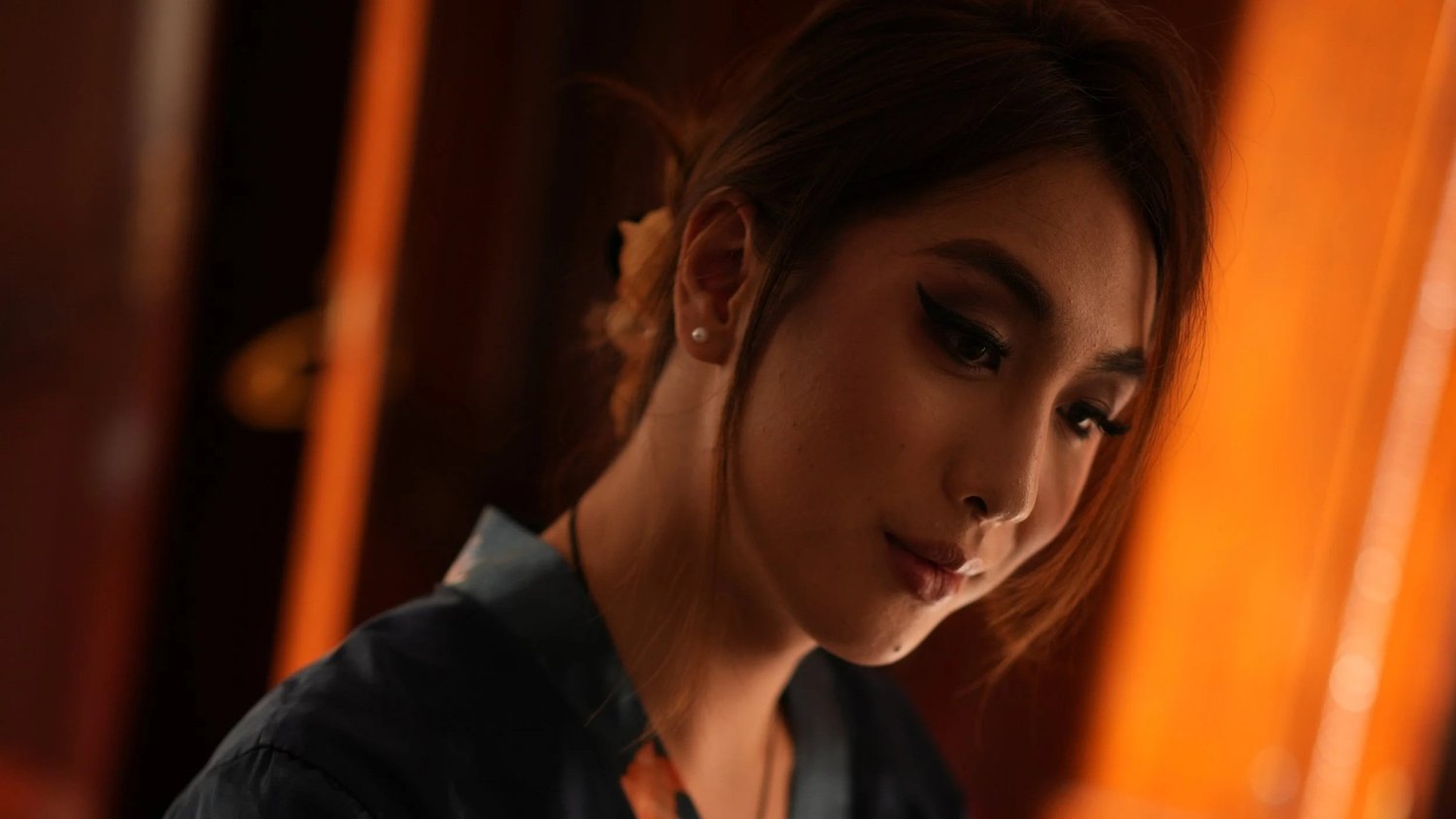Living Fearlessli: Interview with Lee Li on Her New Documentary and Forbidden Identities
Craccum's very own Lee Li opens up about her creative process on her journey as an asylum seeker in her coming documentary film
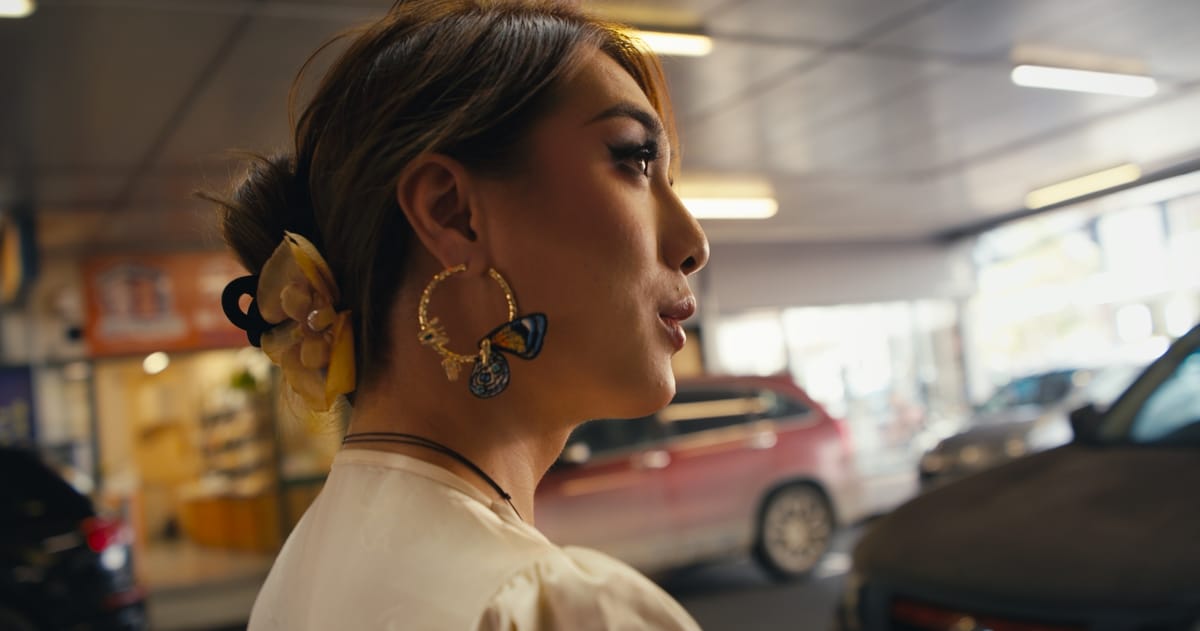
Lee is quite possibly the busiest person I think I have ever met. She has this boundless and seemingly infinite supply of energy that drives her through life. Over the past year, I’ve got to know Lee, seeing glimpses of her filmmaking process as she reviewed her scripts and storyboards while multi-tasking and running Craccum events, setting up our new website, chatting and grabbing a snack.
But the more I’ve learnt about her, the more I am in awe at her resilience and bravery in the face of the sacrifices she has made to be where she is today. For those who don’t know, Lee is a refugee asylum seeker here in Aotearoa, as in China, being a transgender woman is forbidden by the CCP. And as an aspiring documentarian, Lee was given funding by Day One Hāpai te Haeata with support from NZ On Air and Te Māngai Pāho to make a short film about her journey. This was a historic moment as it was the first time such a grant was given to an asylum seeker.
Her documentary, Fearlessli, will debut at the Show Me Shorts Film Festival in October and will later be available to stream on Māori+ and RNZ.
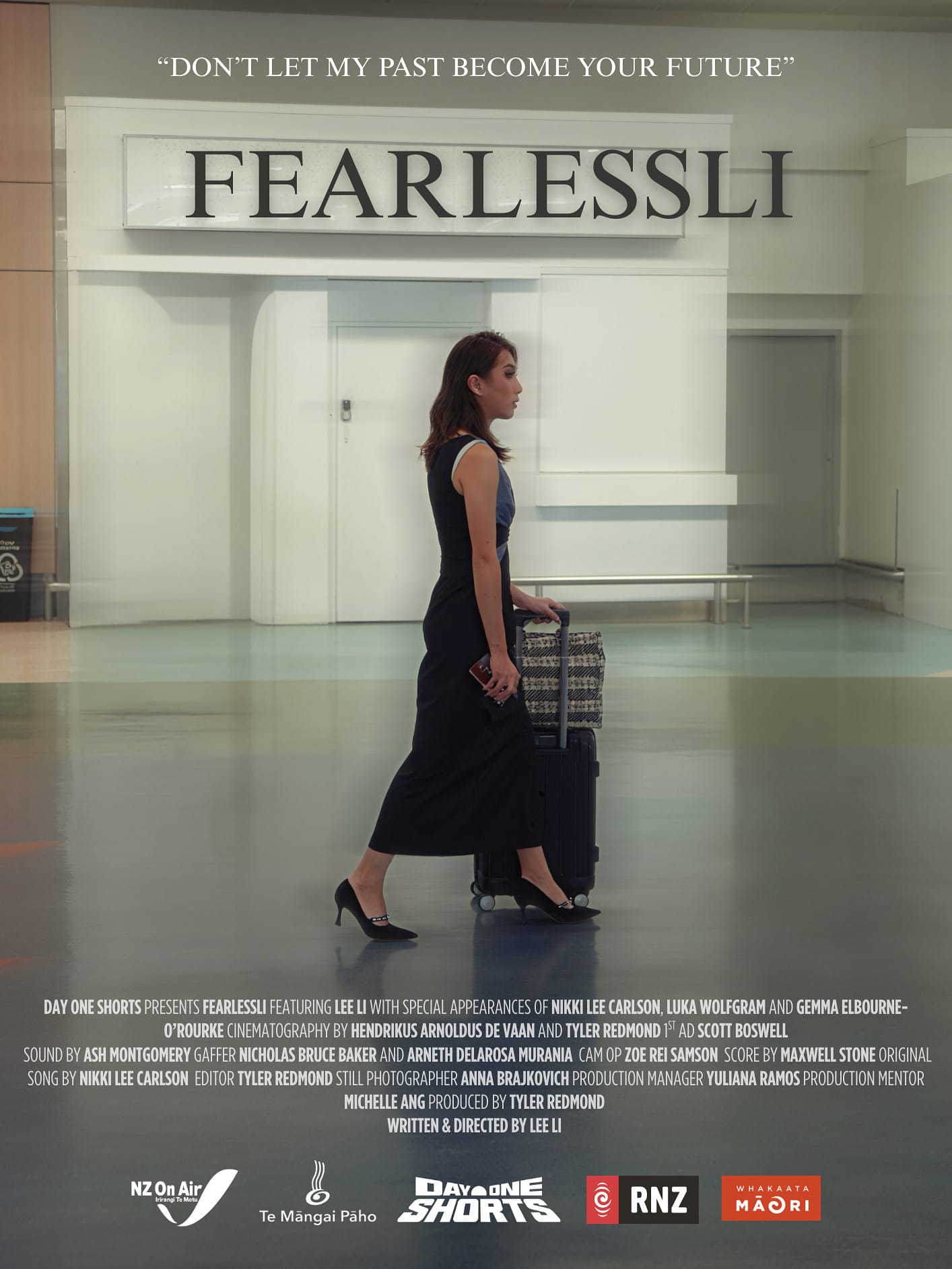
How would you describe the current relationship between trans visibility and state censorship in China?
LL: There’s no free speech in China. A lot of things are considered “forbidden,” and if you say them, you risk penalties or simply ‘disappearing.’ For example, you cannot publicly criticise the Chinese Communist Party, and you cannot openly advocate for LGBTQIA+ rights. (In fact, you’re not really allowed to advocate for anything at all—no protest, no parade.) Quite a few queer and rainbow pages on WeChat have already been shut down. The truth is, Chinese people know these things, but they choose not to say them out loud.
So, when it comes to trans visibility, it’s basically zero to “limited.” And by limited, I mean only negative representation, misrepresentation, or outright derogatory portrayals in mainstream Chinese media. There is a very persistent bias.
China even has a law called 禁娘令, literally translated as the “effeminate ban order,” which promotes a narrow idea of masculinity and is both misogynistic and transphobic. It’s forbidden to show ‘over feminine’ male actors on television, so a few actors have been cancelled due to the law. Unfortunately, in China, they still see me as a ‘man’, because gender is solely defined by ‘sex’, which is your genitals. That makes me not only “undesirable,” but also someone deemed to be erased. On top of that, there’s a common stigmatising slur used against trans people: 人妖, literally “human demon.” This is also the most disheartening part when you learned the entire society doesn’t accept you…
Legally, you can’t even change your gender marker on documents unless you’ve had “full” surgeries. It is humiliating to have a law that forces you to alter your body just to exist. Why shouldn’t I have control over my own body? Why would I have to give up a part of myself just to be who I am? And even if you go through surgery, the government doesn’t update your ID; they issue you a brand new one. Suddenly, you’re a 21-year-old newborn with no family, no history, no education. How are you supposed to find a job, or even survive?
Because of the censorship, I was basically denied the most basic human rights, the right to my own body and the right to live as a decent human being. That left me no choice but to leave my country at the age of 16.
How has your experience as an asylum seeker shaped your sense of belonging within the Chinese diaspora in Aotearoa?
LL: Leaving my country isn’t a betrayal, but a quiet reflection. I am a proud Chinese by blood and by culture, and now I can also proudly call myself a proud tauiwi. I love my language and the Chinese characters (汉字) that my ancestors created over 5,000 years ago. Each character carries its own weight, like a painting that tells a story. They were first carved onto walls, and later written onto paper, so that history could be recorded, culture could be passed down, and stories could continue to point the way toward our future.
For many of us in the Chinese diaspora in Aotearoa, even if we had to leave under extremely difficult circumstances, we carry an even deeper care for our homeland. It is because we cared so much that we were brave enough to call out the government and demand what is right, even when the consequence was retaliation.
Here in Aotearoa, I’ve met other Chinese refugees, and I’d say they are the proudest Chinese I’ve ever seen. They actively promote our culture, our traditions, and our languages in community spaces.
In the film, you can see Chinese cultural elements embedded in art and costume design — for example, Li’s bamboo-patterned nails and her neo-Chinese style dress. As the director, I also want to share the beauty of our culture with a wider audience.
Perhaps what ties us together as a diaspora is this shared voice: we believe in freedom and democracy, even when those values are under attack. Leaving our homeland only intensifies our love and longing for it — even if we can never return, we carry that devotion with us along the path of self-exile.
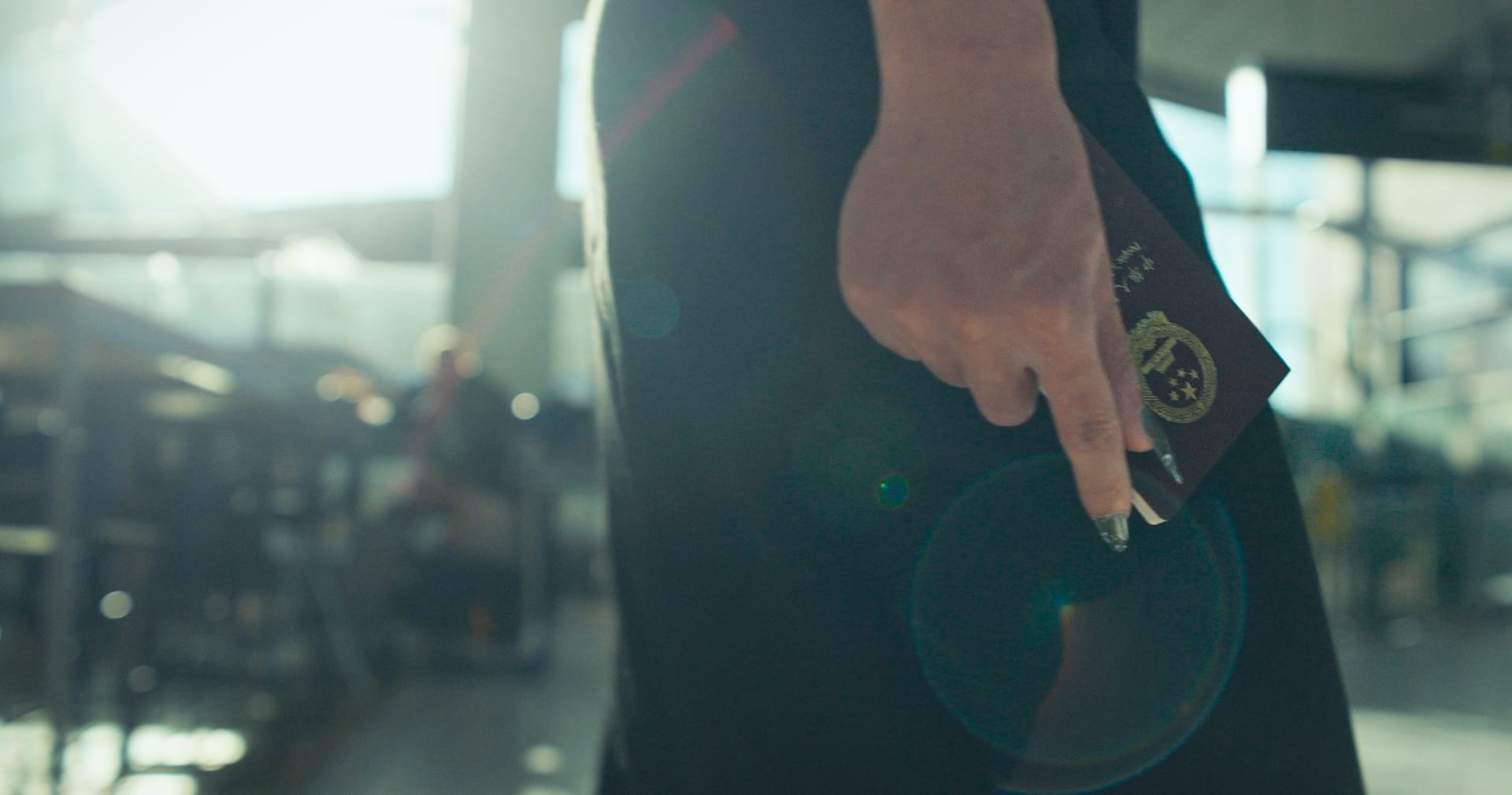
What do you think are the most meaningful steps Aotearoa could take to foster greater understanding and inclusion for trans communities?
LL: I think sex education is one of the most important steps. If schools provide comprehensive and inclusive education about gender identity, sexuality, and respect, young people will grow up with understanding rather than prejudice.
Back in China, almost no one knew the difference between sex (性) and gender (性别). If people had even a basic understanding of that, I might have been able to live my life there. Because there was no sex education, I had to educate myself just to figure out who I am.
FEARLESSLI is my warning to global audiences: don’t let my past become your future. Please make sure every young person has access to comprehensive sex education
What do you think drives the classification of trans identities as mental health disorders in countries?
LL: Again, I think the misunderstanding of the difference between “sex” and “gender” has largely contributed to trans identities being classified as mental health disorders. This misunderstanding is reinforced through cultural practices, traditions, and religions.
In China, for example, we were brought up with the ideology that “all men should only have masculinity,” and “manhood” was defined solely by genitalia. It was “forbidden” for a biological man to wear makeup or show femininity. Because people already had fixed assumptions about your “gender role” based on your sex, the moment you didn’t perform as expected, you were socially expelled or seen as a disappointment.
It’s like a film genre: if a movie is marketed as “horror” but turns out to be a comedy, audiences feel betrayed and may even lash out online. In the same way, society projects rigid labels onto us — and when reality doesn’t match those labels, instead of expanding their understanding, people punish us.
How might we shift public narratives away from rigid biological classifications based on sex and towards an understanding of gender as a social construct?
LL: The same answer as before: provide comprehensive and inclusive sex education to foster a wider and more understanding community. When people learn early on that sex and gender are not the same, and that gender is shaped by culture, history, and personal identity, it shifts the whole narrative. AND OF COURSE!!! — WATCH FEARLESSLI! (lol)
What role does fear, or fearlessness, play in your creative decision-making as both a filmmaker and journalist?
LL: I think filmmaking and journalism share the same integrity: giving a voice to the voiceless.
I always believe that my subject and the characters, their voice is never one of the million but the voice of the million, because the struggle is way too common. And through the pain and struggle, truth and hope emerge. I aim to challenge inequality and give storytelling opportunities to marginalised communities, perhaps drawn from my own experience as a transgender asylum seeker.
Coming from a place where my voice was never heard, so I won’t let anyone else to silence me again. Perhaps that’s where the “fearlessness” comes in: it pushes me to pursue truth and speak up.
At the same time, fear fuels my creativity and artistic sobriety. A good story explores human unease and imperfection—if everything were already perfect, why would we tell the story? Characters often discover themselves and transform in the most difficult situations, and it’s in those moments that the insight of a film truly unfolds.
When I wrote my first film, Space, which later won the Judge’s Choice at the Day One Challenge and helped secure funding for FEARLESSLI, I put myself in very painful situations to experience body dysphoria. Crafting a good story is difficult, but unpacking your own fear can also be therapeutic. Maybe that’s why we make films: to explore, confront, and transform fear into art.
This isn’t your first documentary project. What draws you to documentary filmmaking as a way to tell stories, especially those rooted in lived experience?
LL: Again, I guess, it’s more coming out of my experience of transgender asylum seeker, and I believe the lived experience matters and it can give not only representation but also hope and possibility. I am a firm believer of “you can’t become of what you can’t see”
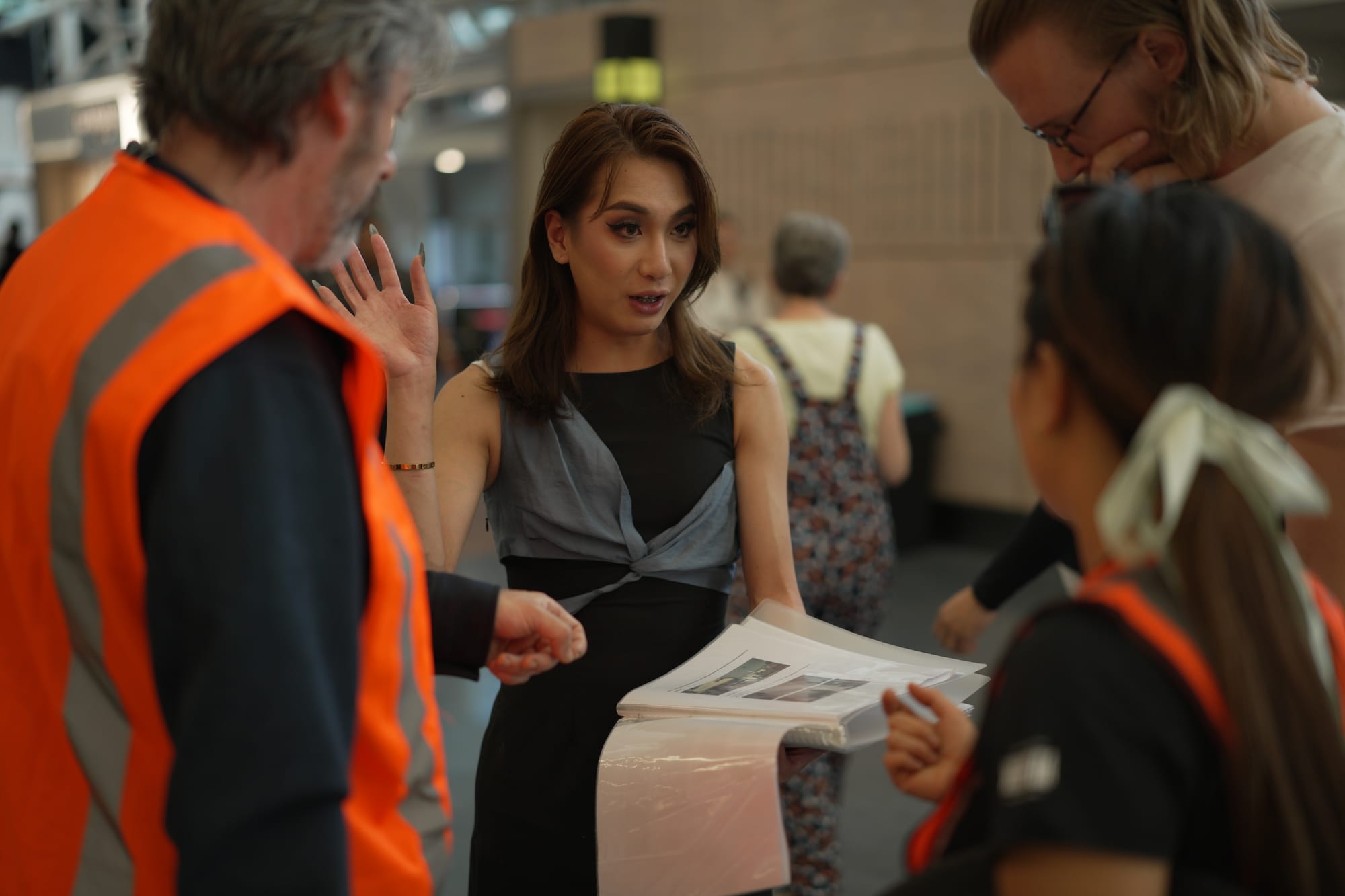
Have any aspects of Chinese cinema, stylistically or thematically, influenced your approach to storytelling in Fearlessli?
LL: Definitely the Chinese aesthetic. If you look closely at the art design—costumes, makeup, and locations—you’ll see many Chinese elements woven throughout the film. Bamboo, for example, is a recurring motif; we even filmed in a bamboo forest.
Bamboo, 竹子, is a classic plant in Chinese culture with a long history, symbolising resilience, flexibility, and integrity—qualities that Fearlessli seeks to express.
How did your collaboration with Nikki Carlson and Pauline Vernon shape the development of Fearlessli’s theme song ‘Fearlessly’?
LL: Having an original song come out of a short film is definitely one of the most beautiful things you could have as a director. Nikki Carlson is a proud whakawāhine (transgender woman) singer and idol based in Aotearoa, and also a close friend of Georgina Beyer. We connected with her during the research phase for the documentary. She was immediately drawn to my film and deeply supportive of my kaupapa, which led to this magical collaboration.
On a deeper level, as director, I wanted to celebrate Nikki’s voice as a proud transgender singer. In the industry, particularly among directors and producers, there’s a term called “passing.” During auditions, some talents get passed over simply because they don’t fit into idealised or normalised beauty standards—for example, the pitch of their voice or even their accent. I didn’t want to pass over trans voices. Instead, I wanted the audience to truly hear and appreciate these beautiful, diverse voices.
What kind of change would need to happen in China for you to feel safe or welcome to return, even if just to visit?
LL: Apart from recognising self-identification, China would need to abolish state-wide censorship, allow its citizens to criticise the government, and restore the right to free speech and democratic expression. Because I made a film that challenges the CCP’s policies, it wouldn’t be safe for me to return to China, even for a short visit. They see me as a “dissident,” even simply for claiming refugee status. It’s also deeply upsetting that my film could potentially put my family in China at risk. The stakes of making this film were extremely high—but if I don’t tell my story, the truth will never come forward.
What lessons can Aotearoa learn from recent setbacks in trans rights abroad (e.g. UK and the USA), and how might we safeguard progress here?
LL: When we were halfway through making the film, I think it’s around April 2025, a Member’s Bill was introduced in Parliament to define women based on biological sex. That was a complete shock to me, and it made me feel unsafe in a very obvious and ‘familiar’ way. FEARLESSLI was inspired by Aotearoa’s leading liberal gender politics—from being the first country to grant women the right to vote, to Georgina Beyer, the world’s first transgender MP elected to NZ Parliament. So to see New Zealand even debating something like this felt like we were sliding backwards, maybe under the influence of what’s happening in the US, which is pretty concerning.
New Zealand is also one of the very first few countries that recognises gender identity as grounds for refugee protection, and it has been regarded as a haven for rainbow refugees. I think if we can continue standing in solidarity and holding on firmly to what we have, it will safeguard progress here. Otherwise, my story could become a lived experience for so many kiwis.
What does the word “home” mean to you now, after everything you’ve navigated?
LL: Home is where you belong, where you can feel safe and accepted. For many refugee claimants, acceptance is literally a line between life and death. If your refugee case is approved, you can embrace a new life. If it’s denied, you could be sent back to your home country, facing severe penalties or even death. Unfortunately, this is the reality.
Now, I can call myself a proud tauiwi because the people here have been so welcoming—they embraced me in so many ways, allowing me to be Lee Li authentically and “fearlessli.” My Māori whānau gifted me a pounamu, and we blessed it under a waterfall, which you’ll see in the film. The pounamu is a roimata, a teardrop, symbolising both grief for the land and the resilience we find within. It is deeply meaningful to me as an asylum seeker. But also, as a storyteller, every time my film is screened, the audience shares their roimata with me, and in those moments, I feel that both our mana is enhanced.
How do you balance personal vulnerability with journalistic integrity when telling stories that are so close to your own life? How authentic can one be when conveying their life story so publicly as you have?
LL: You have to trust the weight of your story and believe in your kaupapa. Remember, you are the only one who can tell your own story. But often, documentary filmmaking touches on very vulnerable and sensitive matters. As the director as well as the journalist, you always need to draw boundaries to keep your subjects safe and not utilise or leverage their stories—always ethical considerations. But because I am both the subject and the director, I was willing to take the risk of telling my story and also ‘reliving’ my trauma.
One fun fact about making this film is that I actually had two therapists attached to the production. We shot on Saturday and Sunday, and then on Monday, I went to see my therapists.
I also filmed one of my Chinese friends who is queer. Before we shot, I double-checked if they were okay being on camera—not only because of the potential danger if they returns to China one day, especially after criticising the CCP, but also because they hadn’t come out to their parents yet. I didn’t want to be the one to out them on screen before their own family. But they told me, “I want to do it because I believe in your kaupapa.” So, we filmed. Unfortunately, during postproduction, we realised the risk was too high, and we eventually had to pull their part out.
So, there are always a lot of considerations to make. And when it comes to authenticity, I think audiences are smart nowadays—if you are really speaking from your heart, they can feel it. On top of that, documentary filmmaking is factual storytelling, which gives it even more authenticity and therefore more impact.
What sustains your creative momentum, especially when working on stories that carry such personal and political weight?
LL: To be honest, this has been the hardest and most ambitious project I’ve made so far. It takes a huge emotional toll because you have to relive your trauma. What sustains my momentum is spending time with my support system—friends, whānau, and, of course, sometimes my therapists. They help me regain energy and stay grounded in my kaupapa, because it’s easy to feel burnt out when you’re both the director and the subject.
What kinds of stories do you feel are still missing from mainstream conversations about trans and refugee experiences?
LL: I would say intersectionality. There are some trans stories out there, and some refugee stories too, but they’re often told separately. I think a lens of intersectionality would be even more meaningful. For example, being trans in the UK is very different from being trans in Egypt—and looking at those differences through intersectionality can be very thought-provoking.
On top of that, I feel the representation of trans characters in mainstream storytelling is often a little too easy. Of course, there are positive stories out there, which is great, but sometimes they overlook the real, everyday struggles of trans people. Things like the awkwardness of dating, or even intimacy, are often completely omitted from the idealised mainstream narratives. There’s nothing wrong with positivity and normativity, but as storytellers, I think we also need to grasp a sense of ‘sobriety’.
The University of Auckland | Waipapa Taumata Rau claims it is a safe environment for trans students, do you feel it has lived up to that in your experience?
LL: Policy-wise, the university is very promising—it has a zero-tolerance approach to discrimination. But in practice, has it really delivered? I experienced students publicly commenting under my advocacy Instagram account in ways that invalidated my experience as a Chinese asylum seeker and disregarded my transgender identity. When I submitted a complaint to the university, I don’t feel it resulted in any meaningful outcome.
There are also practical issues. Some older buildings, like libraries, don’t have unisex toilets. I understand that renovating can be a huge financial undertaking, but at the very least, the university could provide gender-affirming signage to foster understanding and inclusion. That way, non-binary and trans students could feel safer using “gendered” toilets, for which I am always a big advocate.
Now that Fearlessli has wrapped, what’s next? Do you have ideas or directions for your next creative project?
LL: Definitely need a career break first! But I’m currently on a creativity “retreat,” taking time to slow down, reflect, and reconnect with the people and surroundings around me. I’m using this time to generate ideas for my master’s dissertation, a scripted drama, and really let the inspiration grow naturally from lived experience.
Craccum would like to thank Lee Li for her time to chat with us and share her creative journey of her new documentary "Fearlessli".
Fearlessli (@fearlessli.doco) will have its world premiere at the Oscar®-qualifying Show Me Shorts Film Festival on 11th October 2025 at 3:45 pm. Tickets are now available to purchase here. Following the festival premiere, the documentary will be released nationwide on Māori+ and RNZ.
